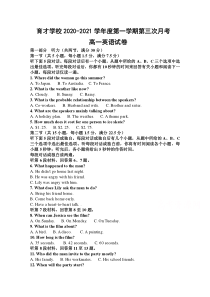 DOC
DOC
【文档说明】安徽省滁州市定远县育才学校2020-2021学年高一上学期第三次月考英语试题 含答案.docx,共(9)页,62.552 KB,由管理员店铺上传
转载请保留链接:https://www.doc5u.com/view-f86e9acd9c273291160b01e7bf4c2f49.html
以下为本文档部分文字说明:
育才学校2020-2021学年度第一学期第三次月考高一英语试卷第一部分听力(共两节,满分30分)第一节(共5小题,每小题1.5分,满分7.5分)听下面5段对话。每段对话后有一个小题,从题中所给的A、B、C三个选项中选出最
佳选项。听完每段对话后,你都有10秒钟的时间来回答有关小题和阅读下一小题。每段对话仅读一遍。1.Wheredidthewomangothissummer?A.ToJapan.B.ToAustralia.C.ToFrance.2.What
istheweatherlikenow?A.Cloudy.B.Sunny.C.Rainy.3.Whatistheprobablerelationshipbetweenthespeakers?A.Co-workers.B.Husbandandwife.C.Brotherandsister
.4.Whatarethespeakersmainlytalkingabout?A.Aholidayplan.B.Theweather.C.Athemepark.5.Howmuchdoesitcostforonepersontoiceskate?A.$1.25.B.$2.25.C.$2.75.
第二节(共15小题,每小题1.5分,满分22.5分)听下面5段对话或独白。每段对话或独白后有几个小题,从题中所给的A、B、C三个选项中选出最佳选项。听每段对话或独白前,你将有时间阅读各个小题,每小题5秒钟;听完后,各小题
将给出5秒钟的作答时间。每段对话或独白读两遍。听第6段材料,回答第6、7题。6.Whathappenedtotheman?A.Hedidn'tgohomelastnight.B.Hewasangrywithhisfriend.C.Lilywasangr
ywithhim.7.WhatdoesLilyaskthemantodo?A.Bringhisfriendhome.B.Comebackhomeearly.C.Haveaheart-to-hearttalk..听第7
段材料,回答第8至10题。8.WhencanJessicaseethefilm?A.OnSunday.B.OnMonday.C.OnTuesday.9.Whatisthefilmabout?A.Abird.B.Adisco.C.Apainting.10.Howlongist
hefilm?A.35seconds.B.42seconds.C.60seconds.听第8段材料,回答第11至13题。11.Whodidthemaninvitetothepartymostly?A.Hisfamily.B.Hisworkmates.C.Hisschoo
lfriends.12.Whenwillthepartystart?A.Atabout5:30p.m.B.Atabout6:30p.m.C.Atabout7:30p.m.13.Whatdoesthemansuggestthe
womanbring!A.Juice.B.Beer.C.Coke.听第9段材料,回答第14至17题。14.Wheredidthemanreadthearticle?A.Inthelibrary.B.Inhisbedroo
m.C.Inthedentist's.15.Whatdidthewriterofthearticleusetobe?A.Ajournalist.B.Ateacher.C.Ascientist.16.Whoelsereadthearticle?A.Thewoman.B.Th
ewoman'sdad.C.Theman'sbrother.17.Whatdidthemanthinkofthearticle?A.Funny.B.Long.C.Boring.听第10段材料,回答第18至20题。18.Whatdoesthespeakerr
emindthestudentstodoatfirst?A.Writedownthenecessaryinformationoneverypageofthepaper.B.Checkiftheyhavetheirs
tudentnumbers.C.Payattentiontothetime.19.Howlongwilltheexamlast?A.50minutes.B.60minutes.C.90minutes.20.Whatcanwelearnfrom
whatthespeakersays?A.ThestudentswillhaveanEnglishexam.B.Theexamwillbegininfifteenminutes.C.Shewillhandoutthepapersnext.第二部
分阅读理解(共两节,满分40分)第一节(共15小题,每小题2分,满分30分)阅读下列短文,从每题所给的四个选项(A、B、C和D)中选出最佳选项。AIusedtoliveinKobeinJapan.Onmywayhomeon
thebuseveryeveningIusedtolookforamanwhooftenplayedhissaxophone(萨克斯)neartheriver.Healwayslookeduprivertowardsthemountain
andhealwayslookedsohappy.Icouldn'thearhismusicbecausethewindowswereclosedonthebusbutIimagined(想像)ittobeloudandclear.Iwantedtobelikethat
man.OnenightIwenttoHimeji,acitynotfarfromKobe.AsIwalkedwithmyfamilyalongtheriverIsawastatue(雕塑).Itwasayoungmanw
holookedjustlikeme.Hewaswearingacapandsmiling.Inhishandswasasaxophone.Hewasliftingthesaxophonetohislipsandhewasjustabouttoplay,Myfamilywalkedonu
ptheriverbutIstayedtherebythestatue,dreamingofplayingasaxophoneonTV.Twoweekslateritwasmybirthday.ImaginemyjoywhenIopene
dmypresentfrommyparentsandfoundthatitwasasaxophone!Iputittomylipstoplay,butitwouldn'tmakeasound.Iblew(吹)andblewb
utIcouldn'tgetittoplay.Iwasalmostcryingwhensuddenlythesaxophonemadethemostbeautifulsound-loudandclearlikeIimaginedthemusicofthemanbytheri
verinKobe.Iblewagainandagain.ButIwasn'tplayingmusicyet.Thencamethelessons.Nightafternight,weekafterweekmyteachermademepractice.SlowlyI
startedtoimproveandatlasttherecamethemagicdaywhenIstartedtoplaymusic.NowI'mintheTVstudiowithmysaxophonestrap(用带子系)tomyneck
andmycaponmyhead.I'mwaitingtobecalledtothestagetoplaymyfirsteversaxophonesolo(独奏)onTV.I'mthinkingofthemanbytheriverin
KobeandthestatuesmilingatmeinHimeji.I'mahappyman.21.Thewritercouldn'thearthemusicbecause_______.A.hewasdeafB.theoldmanwasfarawayC.thewindowsofthe
buswerenotopenD.theoldmanmadenosound22.Thestatuealongtherivermadethewriterthinkof_______.A.theoldmanalongtheriverB.havi
ngasaxophoneC.havingthesamecapandsaxophoneastheboyD.learningtoplaythesaxophoneandplayingonTV23.Theunderlinedword"magic"showsthewriter_______.A.wasve
ryexcitedB.wasverysurprisedC.learnttoplaymusiceasilyD.didn'tknowhowtoplaymusic24.Whatdoesthewriterwanttotellus?A.Howhelearntt
oplaythesaxophone.B.TheoldmanwhoplayedthesaxophoneinKobeinJapanhadagreateffectonhim.C.ThestatuesmilingathiminHimejimadethewriterinterestedinpl
ayingthesaxophone.D.You'llbehappyifyoulivewithadream.BHowquicklycanyoucountfromonetoten?Doyouusetendifferentwordstodoit?Canyoudo
itinEnglish,ordoyouhavetouseyourfirstlanguages?Doyoucountonyourfingers?Manypeoplethinkthatnumbersandmatharethesameallovertheworld.Butscienti
stshavediscoveredthatitisnottrue.Peopleindifferentpartsoftheworldusedifferentwaystocountontheirfingers.Inthe
UnitedStates,peoplebegincountingwiththeirfirstfingerswhichtheyextend(伸出).Theythenextendtherestoftheirfingersandfinallythethumb(拇指)
tocounttofive.Thentheyrepeatthiswiththeotherhandtogettoten.InChina,peoplecountbyusingdifferentfingerpos
itions.Inthisway,aChinesepersoncaneasilycounttotenononlyonehand.Besideswaysoffingercounting,scientistshavefoundthatculturesandla
nguagesarealsodifferentwhenitcomestonumbers.Somelanguageshaveonlyafewwordsfornumbers,andothershavenowordsfo
rnumbers.Agroupofscientistsstudiedaboriginal(土著的)peopleinAustralia.Thesepeopledon’thavehandmovementstos
tandfornumbers.Theydon’tevenhavewordsfornumbers.However,theyarestillabletounderstanddifferentideasaboutnumbers.Inasimilarstudy,research
ersfromtheMassachusettsInstituteofTechnologydiscoveredthatpeopleofthePirahatribe(部落)innorthwesternBrazildon’th
avewordsfornumberssuchas“one”or“three”.Theyarenotabletosay“fivetrees”or“tentrees”butcansay“sometrees”,“moretrees”or“
manytrees”.ProfessorEdwardGibsonsaidthatmostpeoplebelievethateveryoneknowshowtocount,“buthereisagroupthatdoesnotcount.Theycouldle
arn,butisn’tnotusefulintheirculture,sothey’reneverpickeditup.Althoughallhumansareabletounderstandquantities(数量),notalllanguageshavenumbe
rsandnotallpeopleusecounting.Numberwordsinacertainlanguagearearesultofpeopleneedingnumbersintheirdailylives.Nowweknowthatpeoplehave
differentideasaboutnumbersandmath,too.25.Thewriterbeginswiththefourquestionsinorderto__________________A.makeasurveyB.
interestreadersC.tellastoryD.solvemathproblems26.WhatdowelearnfromthedifferenceinfingercountingbetweentheU.S.andChin
a?A.PeoplefromChinacountmuchfasterthanpeoplefromtheU.S.B.PeoplefromChinaneedtwohandstocountfromonetoten.C.Peop
leofdifferentculturesmayusedifferentwaysoffingercounting.D.Peopleofdifferentculturesusethesamewayoffingercounting.2
7.ThestudyofthePirahatribeshowsthat________.A.peopleallovertheworldknowhowtocountB.peopleofthetribehavewordsfornumbersC.somegrou
psofpeoplearenotsmartenoughtocountD.countingisnotusefulinthecultureofthetribe28.Whatisthemainideaoft
hepassage?A.Peoplefromdifferentcultureshavedifferentideasaboutnumbersandmath.B.Chinesepeoplecancountmoreeasilyo
ntheirfingersthanAmericans.C.Insomeaboriginalculture,peopledon’tevenknowhowtocount.D.Somelanguagesdon’thav
enumberwordsbecausepeopledon’tneednumbers.CWhenIwasabout12,Ihadanenemy,agirlwholikedtopointoutmyshortcomings
(缺点).Weekbyweekherlistgrew:Iwasverythin,Iwasn'tagoodstudent,Italkedtoomuch,Iwastooproud,andsoon.Itriedtohearallthi
saslongasIcould.Atlast,Ibecameveryangry.Irantomyfatherwithtearsinmyeyes.Helistenedtomequietly,thenheasked.“Arethethingsshes
aystrueornot?Janet,didn'tyoueverwonderwhatyou'rereallylike?Well,younowhavethatgirl'sopinion.Goandmakealistofeverythings
hesaidandmarkthepointsthataretrue.Paynoattentiontotheotherthingsshesaid.”Ididashetoldme.Tomygreatsurprise,Idiscoveredthatabouthalftheth
ingsweretrue.SomeofthemIcouldn'tchange(likebeingverythin),butagoodnumberIcould—andsuddenlyIwantedtoch
ange.ForthefirsttimeIwenttoafairlyclearpictureofmyself.IbroughtthelistbacktoDaddy.Herefusedtotakeit.“That'sjustf
oryou,”hesaid.“Youknowbetterthananyoneelsethetruthaboutyourself.Butyouhavetolearntolisten,notjustcloseyourearsinangerandfeelinghurt.
Whensomethingsaidaboutyouistrue,you'llfinditwillbeofhelptoyou.Ourworldisfullofpeoplewhothinktheyknowyourduty.Don'tshutyour
ears.Listentothemall,buthearthetruthanddowhatyouknowistherightthingtodo.”Daddy'sadvicehasreturnedtomeatmanyimportantm
oments.Inmylife,I'veneverhadabetterpieceofadvice.29.Whatdidthefatherdoafterhehadheardhisdaughter'scomplaint?A.Hetoldhern
ottopayanyattentiontowhather“enemy”hadsaid.B.Hecriticized(批评)herandtoldhertoovercomehershortcomings.C.Hetoldhertowritedownallthather“enem
y”hadsaidaboutherandpayattentiononlytothethingsthatweretrue.D.Herefusedtotakethelistandhavealookatit.30.Whatdoes“
Weekbyweekherlistgrew”mean?A.Weekbyweekshediscoveredmoreshortcomingsofmineandpointedthemouttome.B.Shehadmadealistofmyshort
comingsandshekeptonaddingnewonestoitsothatitwasgrowinglongerandlonger.C.Iwashavingmoreandmoreshortcomingsastimewe
nton.D.Weekbyweek,myshortcomingsgrewmoreserious.31.Whydidherfatherlistentoherquietly?A.Becausehebelievedthatwhatherdaughter'
s“enemy”saidwasmostlytrue.B.Becausehehadbeensoangrywithhisdaughter'sshortcomingsthathewantedtoshowthisbykeepingsilentforawhile
.C.Becauseheknewthathisdaughterwouldnotlistentohimatthatmoment.D.Becausehewasn'tquitesurewhichgirlwastellingthetruth.32.Whichdoyouthinkw
ouldbethebesttitleforthispassage?A.NotanEnemy,buttheBestFriendB.TheBestAdviceI'veEverHadC.MyFatherD.MyChild
hoodDWastecanbeseeneverywhereintheschool.Somestudentsaskformorefoodthantheycaneatandothersoftenforgettoturnoffthelightswhentheyleavetheclassroo
m.Theysaytheycanaffordthesethings.ButIdon'tagreewiththem.Wastecanbringalotofproblems.AlthoughChinaisrichinso
meresources,weareshortofothers,forexample,freshwater.Itisreportedthatwewillhavenocoaloroiltousein100years.Soifwegoonwastingourresources,what
canweuseinthefutureandwherecanwemove?Thinkaboutit.Ithinkweshouldsaynotothestudentswhowastethingseveryday.Ever
ybodyshouldstopwastingassoonaspossible.Inoureverydaylife,wecandomanythingstopreventwastefromhappening,forexample,turnoffthewaterta
pswhenwefinishwashing,turnoffthelightswhenweleavetheclassroom,trynottoordermorefoodthanweneed,andsoon.Littlebylittle,everythingwillbechanged.
Wastecanbestoppedonedayifwedoourbest.33.Whatmayhappenin100years?A.Wemaystillhaveenoughoil.B.Wemaystillhaveenoughcoal.C.Wemayhaveali
ttleoil.D.Wemayhavenocoaloroiltouse.34.Whichofthefollowingisright?A.Wastebringsproblems.B.Wastecanbringnoproblem.C.Chinaisrichinfreshwater.D.Stud
entsneverwastethings.35.Whichisthebesttitleofthispassage?A.StopWastingB.SchoolLifeC.WasteintheSchoolD.RichResources
inChina第二节七选五(共5小题;每小题2分,满分10分)阅读下面短文,从短文后的选项中选出可以填入空白处的最佳选项。选项中有两项为多余选项。HowtoMakeSmallTalkThere'snothingsmallaboutsmalltalk.Manygreatfriend
shipsandrelationshipshavestartedwithsmalltalk.Smalltalkhelpsyoubuildameaningfulrelationshipwithaperson.36Ifyouwanttoknowhowtom
astersmalltalk,justfollowthesesteps.37Ifyouwanttomakeapersonfeelcomfortable,thebestthingtodoistohavean“openattitude”andto
directyourbodytowardthatpersonwithoutbeingtooforceful.Justmakeeyecontact,don'tcrossyourarms,andfaceyourshoulderstowardthatperson.Thiswillm
akethepersonfeellikeyou'regivinghimallofyourattention.Putawayyourphone.There'snothingmoreannoyingthantalkingtoapersonwho
isconstantlycheckinghiscellphone.Thoughyoushouldlookeagertotalktotheperson,don'tlooktooeager.Don'tleansoclosethatyous
carehimaway.38Giveafriendlygreeting.Ifyou'reseeingsomeoneyoualreadyknow,justsayhelloandgreetherbyhername,“Hi,Jen,it'sgoodtosee
you.”39Ifyoudon'tknowtheperson,introduceyourselffirstsoyoufeelmoreconfidentandincontroloftheconversatio
n.40Justasimple“Iloveyourshoes—wheredidyougetthem?”cangetyouintoafunconversationaboutshoeshopping.Evenifthepraisedoesn'tleadanywh
ere,itwillstillmakethepersonfeelmoreappreciatedbeforeyoustartdiscussingothersubjects.A.Havefriendlybodyla
nguage.B.Focusyourattentionontheirshoes.C.Italsobenefitsyouintheprofessionalworld.D.Manypeopleareturned
offbyaclose-talker.E.Startwithsmallpraise.F.Youwillfeeluncomfortablewhenclosetoothers.G.Thisissimpleanddirectandletsthepersonknowyou'reexcitedtotal
k.第三部分英语知识运用(共两节,满分45分)第一节完形填空(共20小题;每小题1.5分,满分30分)阅读下面短文,掌握其大意,然后从41─60各题所给的四个选项(A、B、C和D)中选出最佳选项,并在答题卡上将该项涂黑。Whatdowemea
nbyaperfectEnglishpronunciation(发音)?Inone41thereareasmanydifferentkindsofEnglishastherearespeakersofit.42twospeakersspeak
inexactlythesame43.Wecanalwaysheardifferences44them,andthepronunciationofEnglish45agreatdealindifferentgeographical46.H
owdowedecidewhatsortofEnglishtouseasa47?Thisisnotaquestionthatcanbe48inthesamewayforallforeignlearnersofEnglish.49youliveinapartoftheworld5
0IndiaorWestAfrica,wherethereisalong51ofspeakingEnglishforgeneralcommunicationpurposes,youshould52toacquireagoodvarietyofthepronunciat
ionofthisarea.Itwouldbea53inthesecircumstancestouseasamodelBBCEnglishor54ofthesort.Ontheotherhand,ifyouliveinacountry55thereisnotraditionaluseofEngl
ish,youmusttake56yourmodelsomeformof57Englishpronunciation.Itdoesnot58verymuchwhichformyouchoose.Themost59wayistotakeasyo
urmodelthesortofEnglishyoucan60mostoften.41.A.signB.distanceC.senseD.mixture42.A.NotB.NoneC.NoD.Nowhere43.A.typeB.sortC.formD.way44.A.betweenB
.ofC.amongD.from45.A.changesB.existsC.variesD.happens46.A.areasB.countriesC.partsD.spaces47.A.directionB.symbolC.guideD.mo
del48.A.analysedB.recognizedC.repliedD.answered49.A.BecauseB.IfC.WhenD.Whether50.A.asB.likeC.unlikeD.likely51.A.customB.traditionC.useD.habit52.A.ai
mB.leadC.accessD.tend53.A.distinctionB.nonsenseC.customD.disability54.A.everythingB.anythingC.nothingD.deeds55.
A.whereB.whichC.thatD.wherever56.A.toB.onC.withD.as57.A.practicalB.nativeC.abroadD.narrow58.A.careB.troubleC.a
ffectD.matter59.A.effectiveB.likelyC.entireD.official60.A.listenB.soundC.hearD.listento第二节语法填空(共10小题;每小题1.5分,满分15分)阅读下面材料,在空白处填入适当的内容(一个
单词)或括号内单词的正确形式。ItwasthefirsttimeforTomJenkins61.(spend)SpringFestivalinChina.Hefoundthehouse62.(clean)fromtoptobottomtosweepaway
thedirtofthepastyearandgetreadyforthenewyear.Itisbelieved63.happinessarrivestoattachFutothedoorupsidedown.Theni
ghtbeforetheSpringFestival,peoplesetofffireworkstoscare64.themonsterNian.XuGangusuallygoesbackhome65.SpringFestivalandchoose66_______(gi
ft)tohisparents67.(care).Hisparentswilltellhimthings68.havebeenhappening.Itwasgreattohavehotpotwithhisfamiliesandfriends.LiYanandher
husbandmisstheirchildrenandgrandchildrenalot.Theystartgettingreadyfortheirhomecoming69.afewweeks.Hergrandchildrenrun,shou
tandplayandherchildrentalkaboutthepastyear.Theygathertoenjoydumplingswhich70.(be)asignoftheirwishesforhealthandhappiness.第四部分写作(共两节,满分35
分)第一节短文改错(共10小题;每小题1分,满分10分)假定英语课上老师要求同桌之间交换修改作文,请你修改你同桌写的以下作文。文中共有10处语言错误,每句中最多有两处。每处错误仅涉及一个单词的增加、删除或修改。增加:在缺词处加一个漏字符号(∧),并在该词下面写出该加
的词。删除:把多余的词用斜线(\)划掉。修改:在错的词下划一横线,并在该词下面写出修改后的词。注意1.每处错误及其修改均仅限一词;2.只允许修改10处,多者(从第11处起)不计分。I’mmorethanhappytohearyou.Youtoldmeyouwere
havingtroublelearnChineseandwantedsomeadvicesfromme.Firstly,whynotlearntosingChinesesongs?It’sagoodwaytolearnChin
eseandcanmakeyoufeelrelaxing.Secondly,youcanmakesomeChinesefriends.Althoughyougetalongwellwithit,theywillhelpyou
tolearnChinese.Beside,itwillbehelpfulifyouwatchedsomeChineseTVprogrammesandreadsomeChinesenovels.Finally,joiningaclubisalsothegoodwa
ytolearnChinese.Inthisway,youwillgetitmorechancestopracticeChinese.Ihopethesuggestionswillbeuseful.第二节
书面表达(满分25分)假设你叫李华,前两天你收到英国笔友Henry的来信,他在信中介绍了他最喜欢的数学老师Mr.Green,并询问你最喜欢的老师。请根据以上提示,给他写封回信介绍你最喜欢的老师。信中要包含以下要点:1.最喜欢的老师及他/她所教的科目;
2.你喜欢他或她的理由;3.他或她帮助你的一次经历与感受。注意:1.词数80左右,开头与结尾已经给出,不计入总词数;2.可适当增加细节,以使行文连贯。DearHenry,Iamgladtohearthatyougetonverywell
withyourmathsteacher,Mr.Green.NowI'dliketotellyouaboutmyfavouriteteacher.Bestwishes!Yours,LiHua高一英语第三次月考答案听力:1-5BABAC6-10CBBAB11-15BCAC
B16-20CAACC阅读理解:21-24CDAD25-28BCDA29-32CAAB33-35DAA七选五:36-40CADGE完型填空:41-45CCDAC46-50ADDBB51-55BDBBA56-60DBDAC语法填空61.tospend62.cleaned63.
that64.away65.before66.gifts67.carefully68.that69.in70.are短文改错:1.在hear后加from2.learn→learning3.advices→advice4.relaxing→
relaxed5.Although→If6.it→them7.Beside→Besides8.watched→watch9.the→a10.去掉get后面的it参考范文:DearHenry,Iamgladtohearthatyouget
onverywellwithyourmathsteacher,Mr.Green.NowI'dliketotellyouaboutmyfavouriteteacher.Mr.Gaoismyphysicsteacher.HeisthebestteacherIhaveev
erhad.Heispatientandfriendlybutsometimesstrict,too.Hecanmakehislessonslivelyandinteresting.Goingtohislessonsissomethingwelookforwardto.
PhysicsisnotmyfavouritesubjectandIfindphysicsismuchharderinSeniorHighschoolthaninJuniorHighschool.Ialmostwanted
togiveup.Mr.Gaogavemesomeadviceonhowtoimprovemyphysics.Heevenoftenhelpsmeinhissparetime.NowmyphysicsisimprovingandIhav
ebecomemoreconfident!IthinkIamreallyluckytohavehimasmyphysicsteacher.Bestwishes!Yours,LiHua